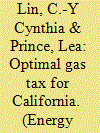| Srl | Item |
| 1 |
ID:
092741


|
|
|
|
|
| Publication |
2009.
|
| Summary/Abstract |
This paper calculates the optimal gasoline tax for the state of California. According to our analysis, the optimal gasoline tax in California is $1.37/gal, which is over three times the current California tax when excluding sales taxes. The Pigovian tax is the largest part of this tax, comprising $0.85/gal. Of this, the congestion externality is taxed the most heavily, at $0.27, followed by oil security, accident externalities, local air pollution, and finally global climate change. The other major component, a Ramsey tax, comprises a full $0.52 of this tax, reflecting the efficiency in raising revenues from a tax on gasoline consumption due to the inelastic demand of this consumption good.
|
|
|
|
|
|
|
|
|
|
|
|
|
|
|
|
| 2 |
ID:
128401


|
|
|
|
|
| Publication |
2014.
|
| Summary/Abstract |
This paper uses the methodology of Parry and Small (2005) to estimate the optimal gasoline tax for a less-developed oil-producing country. The relevance of the estimation relies on the differences between less-developed countries (LDCs) and industrial countries. We argue that lawless roads, general subsidies on gasoline, poor mass transportation systems, older vehicle fleets and unregulated city growth make the tax rates in LDCs differ substantially from the rates in the developed world. We find that the optimal gasoline tax is $1.90 per gallon at 2011 prices and show that the estimate differences are in line with the factors hypothesized. In contrast to the existing literature on industrial countries, we show that the relative gasoline tax incidence may be progressive in Mexico and, more generally, in LDCs.
|
|
|
|
|
|
|
|
|
|
|
|
|
|
|
|